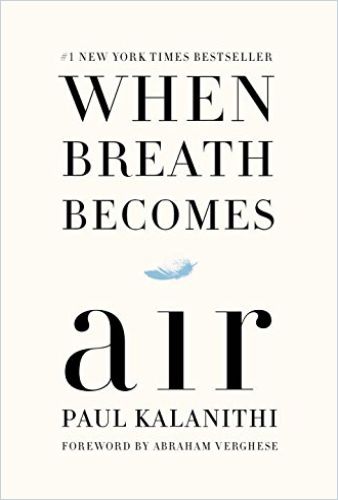Brilliant surgeon and philosopher Dr. Paul Kalanithi details the story of his life, his marriage, his fatal cancer diagnosis and his struggle to stay alive.

Grace in the Face of Death
Dr. Paul Kalanithi, an intelligent, philosophical man, loved literature, medicine and science. He earned a BA and MA in English Literature from Stanford and a master’s in the history and philosophy of science and medicine from the University of Cambridge before studying medicine at Yale.
Near the end of his neurosurgical residency, at age 36, Kalanithi received a fatal diagnosis of stage IV lung cancer. His moving, beautifully written memoir documents his journey from doctor to patient, from saving lives and making life-or-death decisions to grappling with his own mortality. As his eloquent writing shows, Kalanithi faced death with fortitude and courage.
Over the last six years, I’d examined scores of such scans, on the off chance that some procedure might benefit the patient. But this scan was different; it was my own.Paul Kalanithi
The New York Times Book Review; People; NPR; The Washington Post; Slate; Harper’s Bazaar; Time Out New York; Publishers Weekly; and Bookpage all chose this number one New York Times bestseller, Pulitzer Prize finalist, and finalist for the PEN Center USA Literary Awards as one of their Best Books of the Year.
Dr. Abraham Verghese, best-selling author of Cutting for Stone, wrote, “Out of his pen, he was spinning gold.” The Boston Globe said, “The narrative voice is so assured and powerful that you almost expect him to survive his own death and carry on describing what happened to his friends and family after he is gone.”
Diagnosis
Kalanithi and his wife Lucy held each other while processing the news confirming what they had suspected as Kalanithi lost weight and suffered severe back pain. Six months earlier, his X-rays had looked normal, so Kalanithi and his doctor ascribed his symptoms to hard work.
He had 15 months left in his residency and was fielding job offers, but suffering chest pain. Seeing him researching cancer online, Lucy became upset that Kalanithi hadn’t discussed this worry with her. His unrelenting neurosurgical training strained their relationship.
I figured either I had cancer, in which case this might be the last time I would see my friends, or I didn’t, in which case there was no reason to cancel the trip.Paul Kalanithi
Kalanithi’s CT scan showed multiple lung tumors, with cancer in his spine and liver. Kalanithi writes that he told his wife he would never leave her. He checked into the hospital, a patient instead of a doctor.
Uprooted
Kalanithi recounts how his father had uprooted the family, moving from Bronxville, New York, to Kingman, Arizona, which had one of the worst school systems in America. Due to his mother’s encouragement, the author writes, he read every book on a college prep reading list and took his SAT 100 miles from home in Las Vegas. Kalanithi celebrates that he got into Stanford University.
I still felt literature provided the best account of the life of the mind, while neuroscience laid down the most elegant rules of the brain.Paul Kalanithi
Kalanithi, as much a philosopher as a physician, writes that his choice to practice medicine came from his desire to act, not theorize. The author returns to this theme throughout. He chose neurosurgery as his specialty, he says, because it so directly confronted mortality and self.
Being a Doctor
Kalanithi began what he describes as his arduous residency at Stanford, a life of long days filled with life-and-death decisions. The author tells how a one-millimeter slip of surgical knife could sentence someone to a lifetime of decreased capacity. The author details his concerns that treating ceaseless head injuries would inure him to suffering.
Those burdens are what make medicine holy and wholly impossible: In taking up another’s cross, one must sometimes get crushed by the weight.Paul Kalanithi
Kalanithi relates that he tried to understand each patient’s identity and values, illness or injury, to inform his medical choices. Stanford sought a neurosurgeon-neuroscientist, Kalanithi’s dream job. His colleagues felt he was a shoo-in.
Cancer
Kalanithi had, he explains, a treatable lung cancer mutation. His treatment included taking Tarceva, which targets how cancer cells replicate. Within weeks, he felt stronger and hopeful. Kalanithi pushed his oncologist to predict how long he would live, but she refused. She encouraged him, the author discloses, to apply his values to planning his remaining days.
At age 36, I had reached the mountaintop; I could see the promised land…I could see the tension in my back unwinding as my work schedule eased and life became more manageable.Paul Kalanithi
He writes that this advice made his marriage stronger. Kalanithi slowly regained his strength, but, he shares, his pending mortality complicated whether he and Lucy should have a child. Lucy worried a baby would make Kalanithi’s passing even more painful.
After six weeks on Tarceva, Kalanithi discloses, his lungs were clear and his spine healing. With the cancer stable, Kalanithi returned to work, taking only one case per day. He found that the relentless schedule took a physical toll, but he persevered; Lucy was six months pregnant.
New Tumors
Seven months after he returned to surgery, Kalanithi shares that his CAT scan showed a new tumor. He began the cycle of chemotherapy, loss of appetite and malaise and, as soon as he felt better, more chemo.
Once again, I had traversed the line from doctor to patient.Paul Kalanithi
On the day of his graduation, Kalanithi describes a horrible wave of nausea marking the deterioration of his health as his kidneys failed. The author went into the ICU; two days after his discharge, Lucy went into labor as Kalanithi lay on a cot in the delivery room. The author rejoices that on July 4, 2014, Elizabeth Acadia (“Cady”) arrived.
Epilogue
Kalanithi died eight months after his daughter’s birth, in March 2015, surrounded by family and friends.
My carefully planned and hard-won future no longer existed. Death, so familiar to me in my work, was now paying a personal visit.Paul Kalanithi
Lucy recounts Kalanithi’s worries about facing death with dignity; she assures readers that he did.
Compassion and Brilliance
You’ll cherish the wisdom and insights of a man as compassionate as he was brilliant. You will mourn his death and admire his and Lucy’s grace and fortitude. Kalanithi never devolved into self-pity; his philosophical thoughts on dying show a maturity and courage well beyond his years. His writing flows well. The author revels in small details of love and daily life with such joy that he may likely inspire you to do the same. Yet Kalanithi avoids the temptation of directly addressing his readers with homilies on how they should live or think. He tells his own story with a profound understanding of his motivations and constantly celebrates his love for Lucy and Cady.
Other compassionate, thoughtful works on medicine today include Atul Gawande’s Being Mortal and Complications; Henry Marsh’s Do No Harm, and Jerome Groopman’s How Doctors Think.









